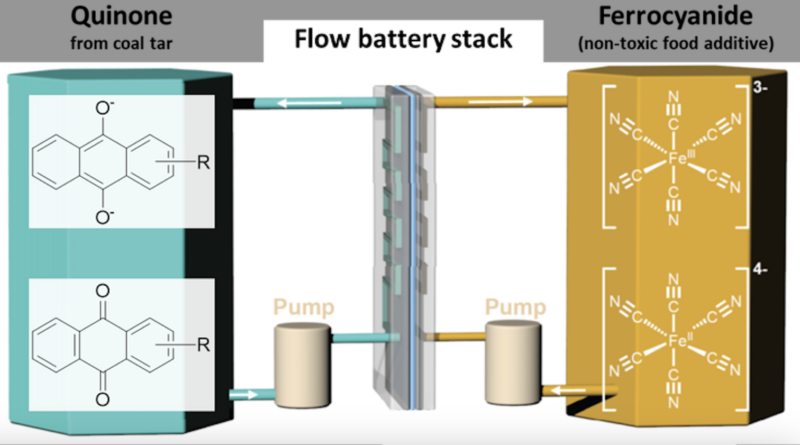Business
Quino Energy Expands Flow Battery Technology to Global Markets

Quino Energy, a California-based startup, is taking its innovative flow battery technology to international markets, bolstering the United States’ role in the global decarbonization movement. The company, which has roots in research from Harvard University, aims to revolutionize energy storage with a system that promises longer duration and lower costs compared to traditional lithium-ion batteries.
Flow batteries work by using two separate tanks of specialized liquids that generate electricity when pumped together. This design allows for energy storage durations of between 8 to 24 hours, significantly exceeding the 2 to 4 hours typically provided by lithium-ion systems. Quino’s approach also simplifies battery management, making it easier to handle extended periods of inactivity.
While flow batteries offer exciting potential, challenges remain. The membranes used in these systems can represent up to 40% of total costs. To mitigate expenses, Quino has developed a water-based formula utilizing quinones, organic molecules that are non-corrosive and commercially available from sources like coal tar. This innovation enables the use of repurposed oil storage tanks, reducing the need for expensive, purpose-built infrastructure.
Despite shifts in federal energy policy this year that could impact funding for startups, Quino remains resilient. Energy storage systems are generally agnostic to their energy sources, allowing for integration with renewable sources like wind and solar, as well as data centers. These systems can help stabilize power supplies and reduce electricity costs, providing a compelling financial case for adoption.
In 2021, Quino received $4.58 million from the U.S. Department of Energy to advance its research and development. Another grant of $2.6 million followed in December 2024, supporting a lab-scale demonstration of its technology. Recently, the California Energy Commission awarded the company $10 million to establish its first commercial project at a healthcare facility, which is expected to save the facility $10 million in electricity costs over 20 years.
Quino’s expansion into international markets received a boost with a new investment from Indian firm Atri Energy Transition, which has pledged $10 million, with an additional $6 million available if needed. According to Quino, these funds will be directed towards scaling production of its organic flow battery electrolyte and demonstrating its effectiveness in real-world applications.
Eugene Beh, CEO of Quino, emphasized the significance of this partnership, stating, “The new electrolyte factory we are planning will enable production at a cost lower than vanadium, the incumbent flow battery electrolyte.” He added that their organic electrolyte can be used with minimal modifications in existing vanadium flow battery systems, allowing for rapid scaling in the industry.
Atri Energy has also expressed its commitment to renewable energy storage, highlighting the critical role of long-duration energy storage in achieving deep decarbonization. Atri founder S Kishore stated, “We believe Long Duration Energy Storage (LDES) is critical for deep decarbonization,” further emphasizing the need for scalable storage solutions.
As Quino continues to form strategic partnerships within the U.S., it recently announced an agreement with Texas-based TerraFlow Energy. This collaboration aims to develop long-duration uninterruptible power supply solutions for high-demand environments, including artificial intelligence data centers and industrial operations.
Quino has highlighted the safety advantages of its flow battery technology over conventional lithium-ion systems. By integrating its patented, water-soluble quinone chemistry with TerraFlow’s architecture, the partnership aims to create fire-safe, scalable storage without relying on critical minerals.
As demand for energy storage solutions rises, Quino Energy’s advancements in flow battery technology position it as a significant player in the evolving landscape of renewable energy. The company’s focus on developing cost-effective and safe solutions indicates a promising future for both Quino and the broader energy storage industry.
-

 Top Stories2 weeks ago
Top Stories2 weeks agoMarc Buoniconti’s Legacy: 40 Years Later, Lives Transformed
-

 Health3 weeks ago
Health3 weeks agoInnovative Surgery Restores Confidence for Breast Cancer Patients
-

 Sports4 weeks ago
Sports4 weeks agoSteve Kerr Supports Jonathan Kuminga After Ejection in Preseason Game
-

 Science4 weeks ago
Science4 weeks agoChicago’s Viral ‘Rat Hole’ Likely Created by Squirrel, Study Reveals
-

 Entertainment4 weeks ago
Entertainment4 weeks agoZoe Saldana Advocates for James Cameron’s Avatar Documentary
-

 Top Stories2 weeks ago
Top Stories2 weeks agoBOYNEXTDOOR’s Jaehyun Faces Backlash Amid BTS-TWICE Controversy
-

 Politics4 weeks ago
Politics4 weeks agoDallin H. Oaks Assumes Leadership of Latter-day Saints Church
-

 Lifestyle4 weeks ago
Lifestyle4 weeks agoKelsea Ballerini Launches ‘Burn the Baggage’ Candle with Ranger Station
-

 Business4 weeks ago
Business4 weeks agoTyler Technologies Set to Reveal Q3 2025 Earnings on October 22
-

 Health4 weeks ago
Health4 weeks agoCommunity Unites for Seventh Annual Mental Health Awareness Walk
-

 Business3 weeks ago
Business3 weeks agoZacks Research Downgrades Equinox Gold to Strong Sell Rating
-

 Lifestyle4 weeks ago
Lifestyle4 weeks agoDua Lipa Celebrates Passing GCSE Spanish During World Tour









